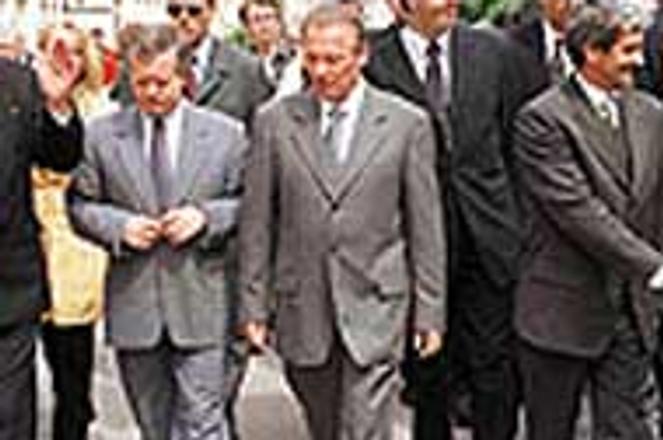Slovak President-elect Rudolf Schuster (centre) leads members of cabinet through the streets of his stomping-ground - Košice in east Slovakia.photo: TASR
Rudolf Schuster, the mayor of Košice and chairman of the minor political Party of Civic Reconciliation (SOP), became Slovakia's first directly elected president on May 29 after beating his rival, former Prime Minister Vladimír Mečiar by a comfortable 15% margin.
According to western diplomats and observers, the result of the run-off ballot corroborated Slovakia's pro-western orientation and the country's ambitions towards European Union and NATO membership.
US Ambassador to Slovakia Ralph Johnson said he was pleased with the results of the election, which he said proved the democratic development of Slovakia since the national elections last September. "There's no doubt that Mr. Schuster will be acceptable not only for the US, but for the whole of Europe," Johnson said at a June 1 press conference.
Schuster, for his part, declared that it would be his primary interest to "convince the international community that Slovakia's movement towards Euro-Atlantic structures is irreversible."
"The main principle of my work as president will be to support the citizens' interests and criticise what is not good for people and Slovakia," Schuster said at a May 30 press conference in Košice. "If someone thinks that I'll blindly serve the coalition just because I came out of it, he is very wrong. I can tell the truth even when it's unpleasant and disadvantageous for me," he added.
British Ambassador David Lyscom told The Slovak Spectator on June 2 that the presidential elections were another sign of the democratic development in Slovakia. "By filling the vacant presidential post," he said, "Slovakia has another chicken in the box."
Lyscom said that the fact that Slovakia had been lacking the highest level representative for 15 months was viewed by the international community as a deficiency. "It's also good news as far as the European Union is concerned," he added.
According to Lyscom, Schuster can be a "good ambassador" for Slovakia as president. "Schuster is internationally experienced as a [former] ambassador, he's experienced in public life as a politician and [Košice] mayor, and he has a good command of both English and German," he said.
Schuster won the second round of the ballot with 57.2% of votes against Mečiar's 42.8%. The election turnout reached 75.4%, over 1.5% higher than the first round.
One of the biggest questions coming out of the election is how the loss will affect Mečiar, the charismatic former prime minister who has dominated the politics of independent Slovakia for most of its history. Analysts disagree about whether or not Mečiar and the HZDS will be strengthened or weakened by the election. Some say his 42% share of the vote makes him an undeniable factor in Slovak politics, and a reminder of the deep political polarisation in Slovak society. On the other hand, with no parliamentary post or position from which to grandstand, the amount of power he will be able to wage may be small.
According to one analyst, Grigorij Mesežnikov, president of the Institute for Public Affairs, a Bratislava-based independent think tank, Mečiar's showing was not strong enough, so he "won't get a stronger position in the political scene, as he has hoped."
For its part, the Movement for a Democratic Slovakia (HZDS), the political organization over which Mečiar has presided since its foundation in 1991, expressed satisfaction with the results, saying that the party would expect the new president to start communication with the HZDS as the strongest opposition political power.
"Schuster has declared his will to be open to both the coalition and the opposition. We will take it for a promise," said HZDS deputy chairman Sergej Kozlík at a press conference after the election.
Local western officials seemed not to be concerned about Mečiar's substantial support, instead touting the unity of the Slovak government confirmed by Schuster's win. The Slovak stock market jumped after results were announced, in part because some voices outside the country had held off on doing more business in Slovakia until the former prime minister was defeated.
Britain's Lyscom largely dismissed Mečiar, saying that "it [Mečiar's showing] was basically the same outcome as of the combined support of the opposition parties in the [September] general elections."
US' Johnson agreed, adding that "Slovakia's politics are being controlled by the current Prime Minister, not the previous one."
One of the main roles of the new president, Schuster said, will be to "ensure confidence of foreigners, to bring in more credit and satisfy the expectations of foreign investors."
Lyscom agreed that the most important outcome of the democratic election was to reassure foreign investors. "The investors will be reassured that the political change that started last September will continue," he said.
Schuster will be inaugurated into his five-year term in office on June 15 in Bratislava's Reduta theatre building. He will officially resign from his mayorship and give in his parliamentary seat on the same day. As he is required to be a non-partisan president by the Slovak Constitution, Schuster will also have to interrupt his membership in his SOP party and hand the chairmanship over to a successor.
Deputy Prime Minister for European Integration Pavol Hamžík, who, as SOP deputy chairman is one of the hottest candidates to become the party new leader, told The Slovak Spectator on June 1, that "[Having Schuster elected president] will certainly help the party in popularity, but I'm convinced that Mr. Schuster will be non-partisan and the party would have no special benefits from his presidency."

